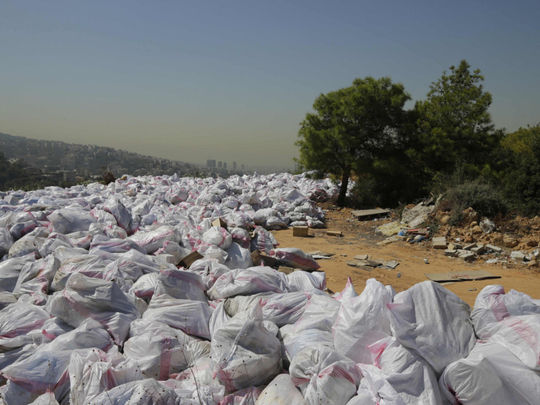
It is really a travesty for a government not to be able to deal with and have rows-upon-rows of litter line the streets and neighbourhoods of a country. This is Beirut 2016. The Lebanese government is deadlocked, dumbstruck and doesn’t have a clue of what to do about the rubbish that has been literally piling up since July 2015.
While the country’s government managed to come up with a solution in March this year, it failed to implement it because of political pressure and sectional and sectarian political interests. This inability to act left the capital and parts of the country festering with smelly litter and toxins, resulting in an enormous health issue. The situation was so bad that one family was reportedly packing its bags and getting ready to move to Syria!
It’s as if the country has come to a standstill, no longer concerned about the “macro politics” of the day afflicting the Arab world; neither worried about Daesh (the self-proclaimed Islamic State of Iraq and the Levant) infiltrating its borders nor apparently bothered about the Syrian civil war next door spilling into Lebanon. No, the Lebanese are now focusing on their own tiny-big problem — depressed and perhaps unwilling to spare a thought about anything else. The issue has become a political matter, staring the nation in the face.
It would be an understatement to say that the Lebanese political system is dysfunctional or has come to a grinding halt. Politicians can’t seem to agree to elect a president because of the many sectarian factions and the country has been without a head-of-state one since 2014. The power structure has become fractured with Christians, Sunnis, Shiites and Druzes — all trying to catch the other out and filter into a clogged government machinery and the public sector.
As a result, the civil administration at the national and local levels are seriously hamstrung, characterised by a lack of functionality and severe bottlenecks in various departments and directorates. It’s a wonder that the bureaucratic set-up has still managed to totter up for so long, given the fact that there has been no national budget since 2005. This is the point we are at now, bringing us to the present garbage crisis with politicians and decision-makers dithering on how to deal with it. Already, too much time has been wasted on merely debating the merits of a long-term plan for garbage management. What is required now are speedy solutions to move the off the streets. Lebanon can’t wait any longer for that to happen.
Garbage is usually no more than an issue to be handled by local civic bodies. Yet, in Lebanon, the wait for this problem to be handled appropriately has just gotten longer and longer, as Beirut froths and is saddled with litter simply because the Naameh landfill was closed without finding suitable alternatives. One can understand that Naameh had to be closed down because it was full beyond its capacity and had become a serious health hazard, with the toxins seeping into the water table.
However, the moot point is that it has been a year since the landfill was closed down. It was opened in 1997 on a temporary basis, with no long-term solutions in mind. And today, Beirut is facing the consequences of such myopic planning. The Lebanese capital and its surroundings generally used to churn out 3,000 tonnes of litter each day. Today, that figure stands at two million tonnes and it’s still rising.
The media has had a field day, highlighting the issue with headlines such as ‘Drowning in ’, ‘Lebanon: River of trash chokes Beirut suburb as city’s crisis continues’, ‘... Lebanon chokes on bad air and bad politics’ and such other colourful screamers.
And while this crisis has been aggravating, the Lebanese Cabinet is busy meeting, cajoling, issuing orders, re-issuing them in search of that elusive solution. Last March, there was a plan to end the crisis once and for all, which meant temporarily opening the Naameh landfill for two months. It called for establishing landfills in other suburbs and districts in Beirut. However, plans for one near the beach had to be abandoned because the Kataeb party members wouldn’t have it in their district. The other, near the airport, was also abandoned because the government was told it would be dangerous as birds would flock to the dump and pose a major threat to aircraft movement.
Meanwhile, several ministries got involved in trying to find a solution under the directives of the Lebanese Cabinet. The Ministry of Interior was supposed to follow-up on the issue through its committee meetings and then the file was to be handed over to the Ministry of Agriculture. The Ministry of Environment also got involved. However, a row broke out between the minister of interior and the minister of environment, with the latter issuing a public statement that its not his ministry’s responsibility to clear out the and that its only involved in environmental studies.
Meanwhile, the municipalities also got involved and so did the Council of Development and Reconstruction. So the issue of removal of garbage is stuck in a bureaucratic maze. And right now, nobody really knows when this nightmare will end.
Marwan Asmar is a commentator based in Amman. He has long worked in journalism and has a PhD in Political Science from Leeds University in the UK.










